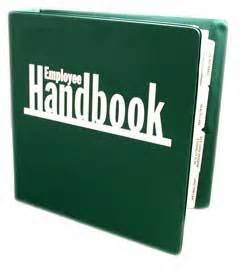Well practically everything including the kitchen sink!

You need to include everything and anything you want your employees to know, understand, rules to follow, flow charts, lists, down to what will happen if the rules are not followed.
This goes well beyond just the hiring information or application we have discussed so far, as you will see. Some companies put their application as the first pages of their handbook, which is removable, giving the new applicant the opportunity to see and read the handbook before they even fill out or turn in their application. This allows the applicant to see if they could or would like to be a part of the company and follow the rules that are in place. I myself have gone through applications and interviews, to be offered a job that once I saw and read their handbook, I said turned down the job. Or ones that I was allowed to see their handbook with the application and did not even bother filling it out. This saves both you and the applicant valuable time and possibly money. Of course it is to say you should NEVER just pass out your application or handbook to just anyone that comes by looking for a job. I would never suggest at any time that you allow your handbook or even an application out of your office if the applicant has not already been hired. If you have a large business or one that hires crews seasonally you might also want to have a hiring seminar that you have advertised and booked applicants to attend that allows for you to discuss all aspects of the work you are offering even before a single application is filled out, all at one time just like I use to do once or twice a month for DirecTV technicians.
A handbook must cover every employee equally in your business, being specific to cover each job position but must also include all general information to cover everyone from the boss on down. Here are things you should think about including:
The exact list or order of the companies hiring practices including the location of the testing facilities if used.
The rules in regards to the application and that all information becomes part of their permanent record and must be truthful.
A list of the job descriptions of all employee positions, with their specific one highlighted or indicated so they know the exact tasks their job will entail.
Include here the start and end time for work for the different positions, days of the week, reasons where overtime may me needed and how it will be paid.
A list of all the reasons someone may be terminated from their position.
That job performance infractions will be given, verbal then written warnings before termination except for things like theft, drug use, sexual harassment, battery of any kind, (list what ever you feel is necessary) which are grounds for immediate dismissal.
You can state what ever you rules you want to make for their payment of last wages, deductions if any and why, if theft or damage was involved etc.
In other words you can list in your hand book any rule you wish, so long as it is not illegal, and it applies to all if it is a general rule or for everyone that holds that same position if the rule is task specific. For instance you can not list as a reason for termination of not wearing safety gear for the bookkeeper, or failure to deposit funds into the bank for the window washer. But you could list removing company property, not authorized, from the premises for anyone.
You can include rules such as; when and if outside food can be brought to work, where and how it is to be labeled and stored. If some things like water in coolers on trucks will be supplied by the company but the cups to drink from will not. When and where breaks from work are allowed and for what reasons. How many days notice must be given for doctors appointments and if they will count against sick time or will be unpaid time off, etc. In fact any situation you can think of should be addressed in your handbook and if not steps that should be followed if no rule is listed, such as the need to first speak to a supervisor, owner or manager.
The last thing that is most important is documenting that the new hire has been made aware of the rules and understands them. This is done by having the new hire put their initials in blue ink on every page of the handbook with a company witness watching and that a final page states that, fill in the name, has read and understands all the rules and that any questions where answered to their satisfaction which is signed by both the new hire and the witness and that final page is removable and placed in their file with the handbook itself then given to the employee for their records and future reference. The handbook should also state that this copy is not to be shared, copied or sold and the consequences for so doing, like termination.
It is always good advice to keep a master handbook where your employees can access it at any time incase they can not find their copy or it is not available before they need to know the answer to a question or situation that comes up. You can and should make changes to your handbook as the need arises and all you need to do to make a change is to print out the new page for every employee, have them read and initial it with a witness, a copy should be made for them to take with them to place into their own handbook copy the origianl will go into their file.
In this day and age it is a good idea to have in your handbook explicit rules about the use of cell phones, are they allowed or only provided work phones for business only, on taking personal calls, taking photos with personal phones or business phones, social media accounts, what can or can not be posted to the business social media accounts. Should you even have your employees listed as friends on your business accounts. I say no but some companies do and have very strick rules about what can be shared or seen from these employees accounts. You do not need some employees friend posting porn to their wall and have it reposting to your business page!
Handbooks can be a simple or detailed as you wish them to be. I have seen some that were only two pages to ones that where so thick they where bound! Just make yours what you feel is best for you and your business. Tomorrow will be the last installment about background, credit checks and drug tests.
